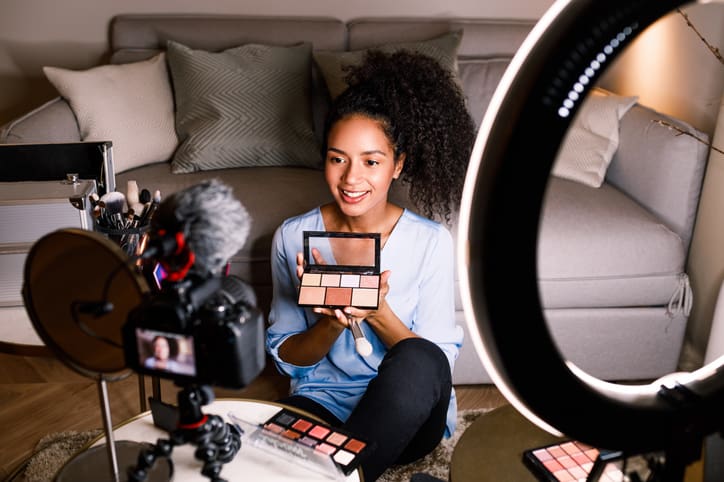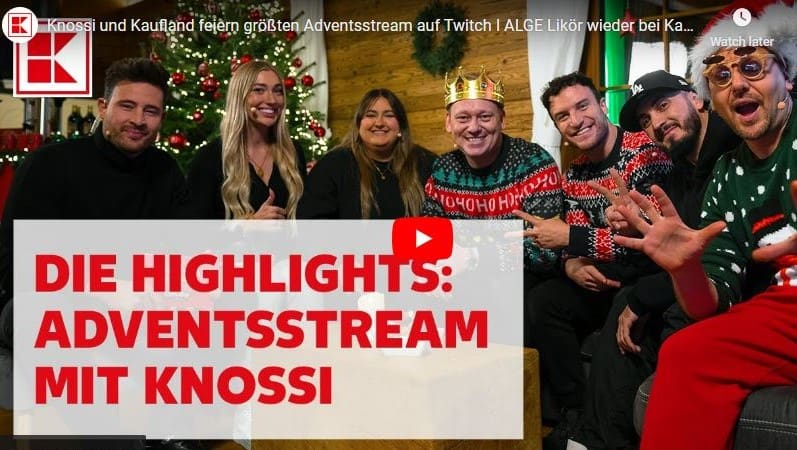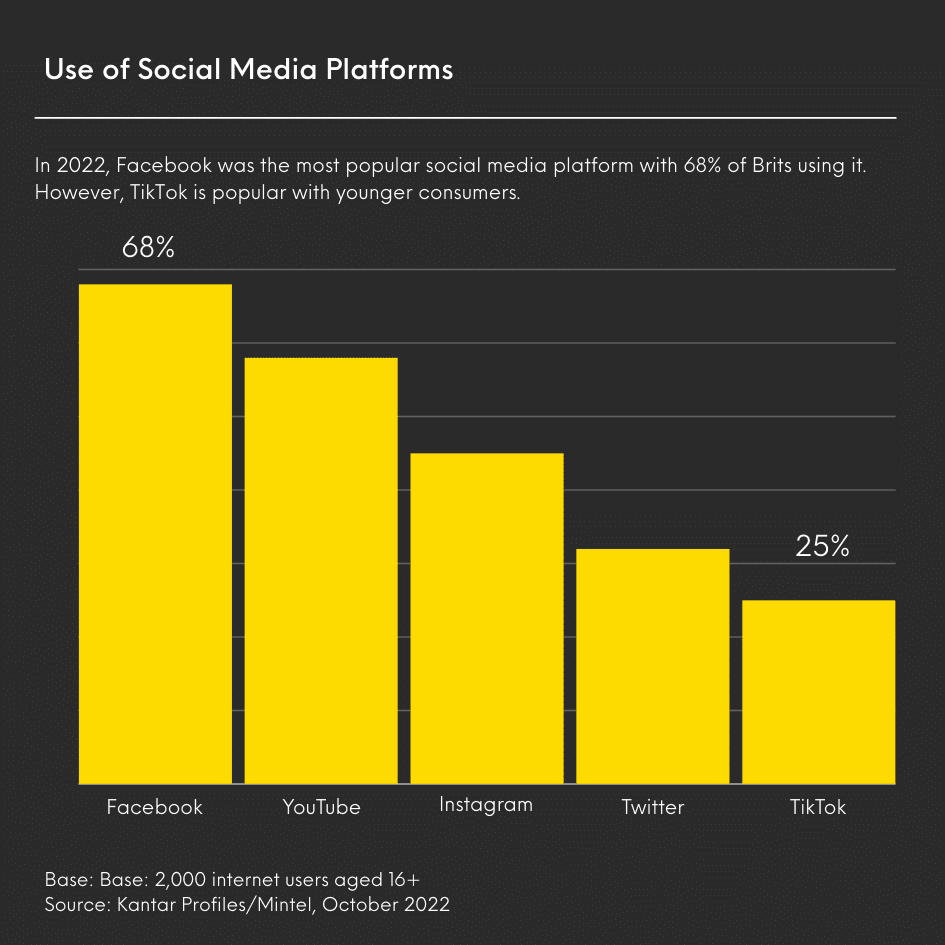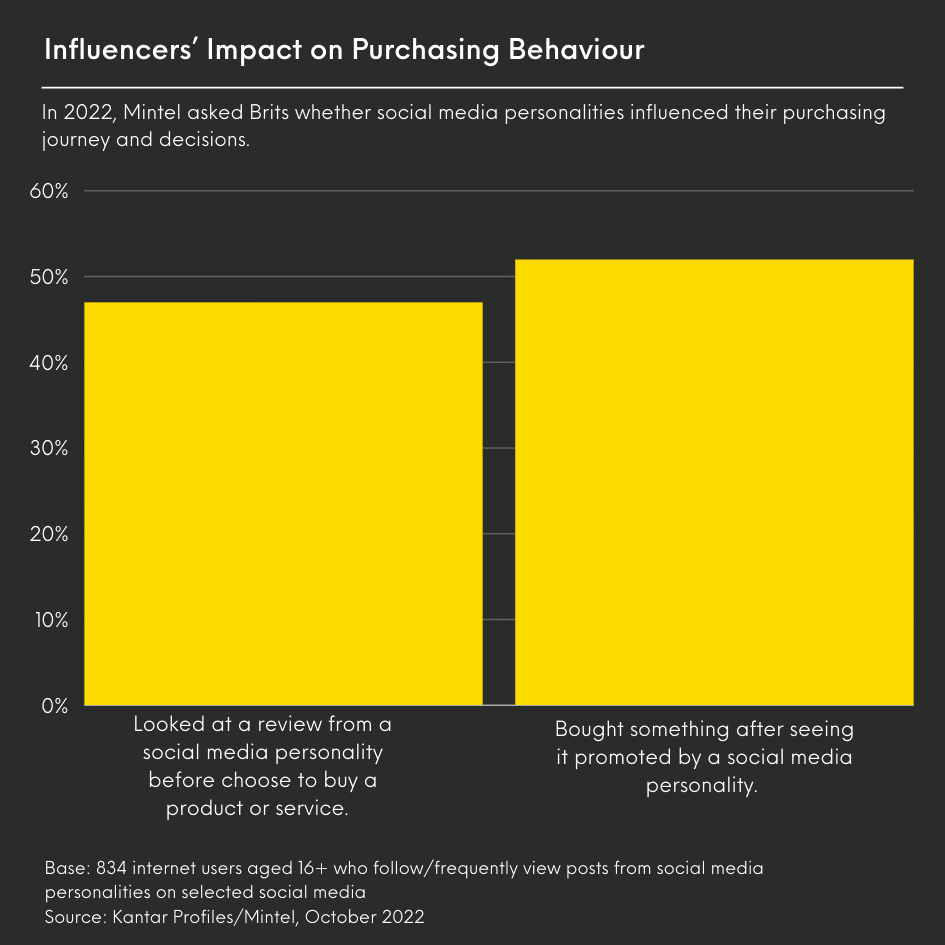The Impact of Influencer Marketing on Consumers’ Purchasing Journey


Influencer marketing has emerged as a powerful tool for brands to connect with consumers and drive business growth. Is your business making the most of online influencer marketing?
In recent years, influencer marketing has become a rapidly growing industry, and for good reason. It’s a powerful way to reach and engage with consumers, increase brand awareness and can be incredibly effective at boosting sales. In fact, a significant 47% of British adults and 45% of German 16-34-year-olds have purchased products that were promoted by a social media personality.
How did we get here?
The concept of influencer marketing has been around longer than you might think. Before social media, charismatic and iconic personalities influenced the lifestyle choices and purchasing decisions of consumers in print, radio and television product advertisements. However, the rise of social media has created the opportunity for anyone to accumulate a large following by creating content that engages with their followers on a personal, authentic level.
In this article, we’ll explore how social media influencers impact the purchasing behaviour and decision-making of consumers and explore the growing reliance brands have on influencer marketing to connect with their target audience, enhance their brand credibility and authenticity, and increase sales.
What is Influencer Marketing?
Influencer marketing is a type of marketing strategy that involves a collaboration between influencers and brands to promote brands’ products or services. Influencers are individuals who typically have a large following on social media. They are able to reach and engage with a large audience, are often considered experts in their niche industry, and have a significant impact on their audience’s purchasing decisions.
How an Online Influencer Marketing Agreement is Made
A partnership between a brand and an influencer can vary depending on the campaign objectives, but here are three common methods of online influencer marketing deals.
- Flat fee
An influencer is paid a flat fee per post to promote a brand’s product or service. The fees can range from three figures upwards depending on the popularity of the influencer. Celebrities can typically charge much higher per post.
- Performance-based
For this arrangement, the influencer’s compensation is tied to specific metrics, such as the number of impressions, engagements, or sales generated.
- Affiliate commission
This deal is structured by influencers posting a promo code or a link to a purchase gateway. Whenever a consumer purchases the advertised product using those avenues, the influencer earns an affiliate commission.

Female vlogger showing cosmetic accessories while recording content
The Current Outlook of Influencer Marketing
In the face of economic uncertainty and global conflicts, many companies are scaling back on their advertising budgets and limiting their media spend. This unique environment presents an opportunity for brands to collaborate with influencers, as social media content can be a valuable resource for providing reassurance and advice to consumers who are prioritising value-driven purchases.
With that said, as people are forced to cut back on their non-essential spending, it creates a challenge for influencers to stimulate sales. This necessitates adapting their strategies to adopt a tone that is empathetic to those facing financial difficulties. Nonetheless, inflation is driving shifts in consumer behaviour, with an increased emphasis on in-home leisure activities such as social media browsing, brands can capitalise on this trend by leveraging the power and influence of social media personalities.
German hypermarket chain Kaufland is a brand that successfully leveraged influencer marketing on social media to foster in-home entertainment. They partnered with notable social media personalities to host an entertaining live stream on Twitch, catering to consumers’ demands for engaging content while simultaneously promoting products and driving brand awareness. This collaboration effectively demonstrates the power of online influencer marketing to drive engagement during financially strained times.

German hypermarket chain Kaufland reap the benefits of influencer marketing. Source: YouTube/Kaufland.
Reasons for the Rising Popularity of Online Influencer Marketing
Aside from the economic uncertainty, there are several other factors that are causing influencer marketing to gain traction. Here is a breakdown of some key points:
- Shifting search habits
Mintel’s Technology Trends research explores how there has been a noticeable change in search behaviour, particularly among younger demographics. Almost half of Gen Z consumers turn to social media platforms like TikTok and Instagram for recommendations and suggestions before using a search engine. This trend could amplify the relationship between influencers and viewers, as viewers actively seek advice and suggestions on places, services and products.
- Diminishing third-party cookies
The decreasing reliance on third-party cookies due to privacy concerns presents a hurdle for traditional advertising methods that rely on tracking behaviour. As third-party cookies continue to diminish on web browsers, brands will need to seek alternative ways to track their campaigns, such as contextual targeting, and gather insight into consumer behaviour, interests and preferences.
- Consumer feedback
Mintel’s research reveals that consumers have an increased willingness to give influencers feedback, which can offer brands valuable insight into their preferences and buying habits that weren’t previously freely available.
Brands are increasingly recognising the potential of influencers to reach their target audience in a more personalised and cost-effective manner, making online influencer marketing a valuable tool in the modern landscape.
Visit Mintel StoreWhy Online Influencer Marketing is so Effective
In today’s digital age, social media has become an integral part of our lives with 4 in 5 Brits using social media. While YouTube and Facebook are the most popular social media platforms in the UK and Germany, they are not very popular with young consumers, the key target group for online influencer marketing. However, half of German and UK consumers aged 16-24 use four or more platforms, highlighting how a multichannel approach is needed to maximise brands’ reach.

Since TikTok burst onto the scene, it has significantly altered the social media landscape, putting short videos front and centre. However, Mintel’s research shows that usage remains highly concentrated among younger people, with 7 in 10 16-24s using TikTok. TikTok’s ability to leverage short videos that resonate greatly with consumers has created a playground for social media personalities. Nearly two-thirds of Brits use TikTok to follow influencers, illustrating why these personalities have become highly valuable to brands and the purchasing process.
Direct impact on purchasing behaviour
Mintel’s experts have tracked the growing impact online influencers have on consumers’ purchasing decisions. Almost half of Germans and Brits have purchased a product from a social media personality they follow, and 5 in 10 Brits who follow influencers have looked at a review by them before making a purchase. The engagement with personalities on social media highlights why it is such a valuable platform for brand partnerships and sponsored content.
While there are many reasons why social media influencers are so popular, Mintel identifies a key reason being that they enjoy a solid level of trust among their followers. Three-fifths of UK consumers believe the social media personality they follow is an expert in the topic they cover. Similarly, over half of Germans aged 16-34 following influencers trust that they genuinely like the products they promote. In today’s world, where consumers are bombarded with advertising, it is more important than ever for brands to find ways to connect with their audience in a genuine and authentic way. A social media personality is able to do this by building trust with their followers and as a result, are perceived as an authoritative voice that they listen to and rely on. The importance of trusted influencers in the purchasing journey is further reinforced by the fact that consumers are adopting savvy shopping habits in response to financial constraints, meaning that many people will be seeking more information and validation before purchasing.

Relateable social media personalities
Unsurprisingly, most consumers find the social media personality they spend the most time viewing content from as likeable. Interestingly, a considerable number of young Germans follow influencers who openly discuss their personal problems. In addition to choosing influencers based on their relatability, brands can also collaborate with social media personalities who candidly share their own issues in order to foster trust. This strategy could be particularly advantageous in the beauty industry, if influencers share their own skin issues and advocate for reduced use of beauty filters, brands and influencers can work towards deconstructing unrealistic beauty standards.
Challenges Faced by Influencer Marketing
While an effective strategy, influencer marketing presents several challenges that brands need to consider:
- Authentic collaborations
While a growing number of young consumers consider influencer marketing to be trustworthy, brands and social media personalities must continue to battle scepticism about the believability of recommendations among other consumers. Almost half of German consumers believe that influencers tend to say what their followers want to hear, instead of voicing their own opinions. This signals a demand for more authenticity. Brands have to meet the challenge of finding influencers who genuinely align with the brand’s values and products as inauthentic endorsements can damage a brand’s reputation and trust.
The trend for authenticity is reiterated by the success of BeReal as the app enables users to share unfiltered photos within a two-minute window. In August 2022, e.l.f. Beauty became the first beauty brand on BeReal, offering exclusive glimpses of new products, promotions and behind-the-scenes photo shoots. This move by e.l.f Beauty reveals the untapped potential of BeReal, where influencers have the opportunity to effectively promote brands’ products while maintaining the genuine and spontaneous essence of the platform. As a result, BeReal has the potential to become an incredibly influential promotional tool.
- Ensuring brand control
Brands face the challenging task of finding the right balance between granting influencers creative freedom to create engaging content, while also maintaining a level of control to ensure consistency with brand messaging and guidelines. An example of this is when influencers conduct live stream product reviews which can resonate with consumers due to the perceived honesty. However, brands now have the added responsibility to monitor and address any negative or inappropriate content, something they wouldn’t have to do if the content was created internally.
- Downside of social media consumption
While social media has become an integral part of our lives, its unrealistic portrayal of lifestyles can foster comparison, stress and low self-esteem. Mintel’s insights reveal that exposure to idealised influencer content can lead to feelings of inadequacy which causes two-thirds of social media users aged 16-24 to want to reduce their time spent on social media. To mitigate these downsides, brands need to encourage influencers to promote healthy lifestyle habits and provide realistic expectations of products.
Looking Ahead with Mintel
Social media’s pervasive presence and the influence of social media personalities have revolutionised the marketing landscape. Online influencer marketing has emerged as a powerful tool for brands to connect with younger consumers, enhance brand perception, and drive business growth. By adopting a multichannel approach and collaborating with trusted influencers, brands can effectively navigate the complex world of social media and achieve their marketing objectives.
Don’t let influencer marketing pass you by! Understand How Influencer Marketing Will Shape the Future of the BPC Industry by reading Part 2 in our Online Influencer Marketing Series.
Mintel - The world’s leading Market Intelligence agency
From fast answers to deep insights, Mintel has provided research and market intelligence solutions to consumer-focused businesses for more than 50 years. With a combination of world-class syndicated tools and custom insight solutions, we are your eyes and ears in the markets that matter and the insights behind your next big idea.
Want more like this?
Want more like this?
Insight delivered to your inbox
Keep up to date with our free email. Hand picked whitepapers and posts from our blog, as well as exclusive videos and webinar invitations keep our Users one step ahead.
By clicking 'SIGN UP', you agree to our Terms of Use and Privacy Policy


By clicking 'SIGN UP', you agree to our Terms of Use and Privacy Policy
Other content you may be interested in
Categories

Want more like this?


Want more like this?
Insight delivered to your inbox
Keep up to date with our free email. Hand picked whitepapers and posts from our blog, as well as exclusive videos and webinar invitations keep our Users one step ahead.
By clicking 'SIGN UP', you agree to our Terms of Use and Privacy Policy







![The State of Digital Content [2026 Edition] The State of Digital Content [2026 Edition]](https://images.bizibl.com/sites/default/files/content-meeting-480.jpg)

